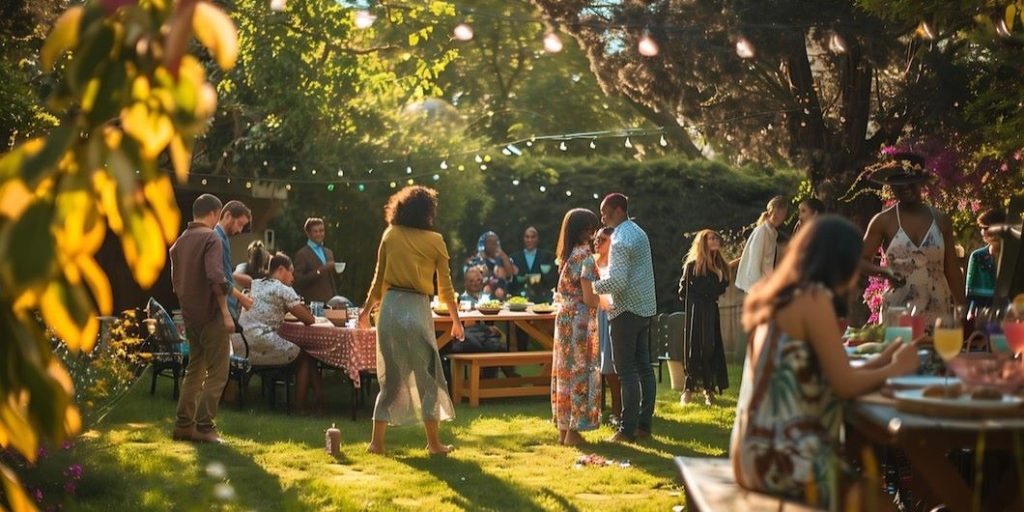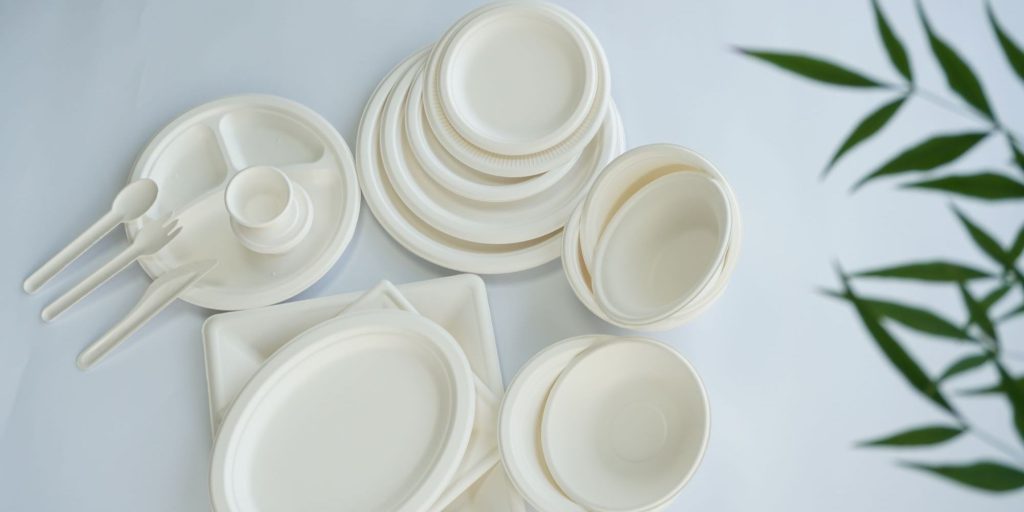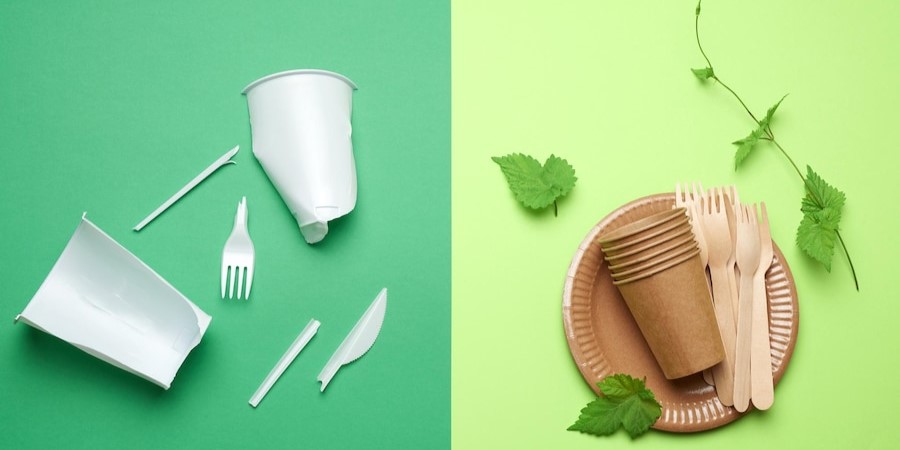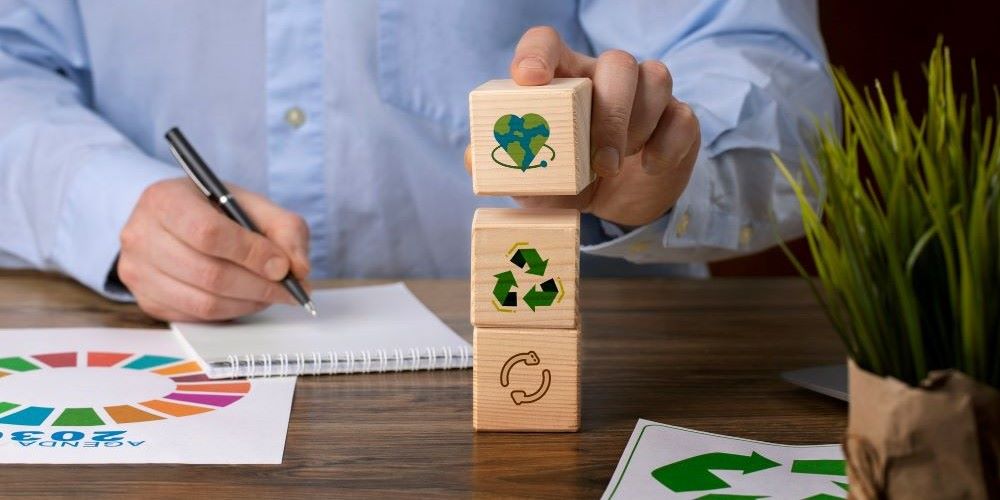Compostable tableware provides event planners with a simple, effective means of minimizing waste and going green. Crafted from materials such as bamboo, palm leaves, or sugarcane, these practical items are fully compostable, returning to nature without adding to landfill waste.
They’re ultra-durable and versatile, with a range that works for everything from casual outdoor picnics to black-tie affairs. With compostables, you won’t have to cut corners to achieve sustainability goals.
Our guide below takes an in-depth look at how compostable tableware can help make event planners greener and more waste-conscious.
Why Go Green with Events?

Whether small-scale or grand in nature, events unite people in important ways, but often with a substantial environmental cost. Event planners can meet this challenge by adopting greener practices. In the process, they will position themselves to better satisfy the increasingly eco-conscious attendees and sponsors that they seek.
Compostable tableware helps propel this change by giving event planners tangible solutions to help cut waste. It’s a clear win in making your event more attractive and improving your reputation.
Events’ Environmental Footprint
From single-use plastics like tableware to food waste, events create a ton of trash. At the same time, traditional plastic utensils can take up to 1,000 years to decompose, frequently leaching toxins into soil and waterways.
Compostable tableware, such as InNature Pack’s bagasse packaging products, breaks down in months when disposed of in the proper environment. It has no negative residues, too, so it’s a green option. By utilizing compostable tableware and putting thorough disposal practices in place, we are supporting a circular economy and reducing our reliance on landfills.
Carbon emissions are yet another consideration. From transporting materials to logistics for the venue’s energy use and more—every decision adds to the event’s carbon footprint. Replacing single-use plastics with compostable alternatives is one simple way we can mitigate this impact.
The Rising Demand for Sustainability
Popular preferences are changing. Plus, eco-conscious attendees and sponsors are taking a harder look at the events they choose to attend and support.
The compostable tableware market, currently growing at a 4.6% CAGR, is a testimony to this trend. Globally, rising awareness of waste issues, like the World Bank’s projection of 3.4 billion tons of annual waste by 2050, pushes people to adopt greener solutions.
When event planners commit to sustainable practices, they are following environmental trends and differentiating themselves. Sustainable improvements like switching to compostable tableware show your events are forward-thinking and responsible.
What is Compostable Tableware?

Compostable tableware is specifically made to decompose naturally and completely, returning to the earth as nutrient-rich soil when processed through composting facilities. Unlike traditional plastic tableware, these products break down without toxic byproducts.
Usually, they’re created out of renewable materials such as bamboo, sugarcane bagasse, or palm leaves, making their lifecycle sustainable. When planners use compostable tableware, event planners are doing their part to minimize this waste while improving the health of our environment.
Defining Compostability
In order for tableware to be considered compostable it must adhere to several strict guidelines. For one, it needs to biodegrade completely, returning to organic matter without leaching harmful substances.
Compostable products more commonly decompose within 90-180 days in an industrial composting environment. Home composting may be slower due to varying conditions. Industrial composting employs higher temperatures and controlled environments, making it better suited for quick decomposition than residential setups.
Materials Used in Compostable Tableware
Because compostable tableware is made from renewable materials, there’s a much lower carbon footprint associated with them. Bamboo and sugarcane bagasse are popular options because they are rapidly renewable resources that have a small carbon footprint.
Palm leaves, usually collected with an eye towards sustainability, provide added firmness without the need for synthetic fillers. Packaging made from these natural materials is devoid of toxic chemicals.
At InNature Pack, we ensure our tableware is made from plant-based materials that combine sustainability with usability.
Certifications for Compostable Tableware
Consumer certifications such as ASTM D6400 and BPI inform consumers of a product’s compostability. Third-party verification builds trust, ensuring items meet rigorous standards.
So event planners need to make certified compostable products front and center in their plans to deliver genuine authenticity and environmental benefits.
Compostable vs. Traditional Tableware: A Comparison

When it comes to helping event planners go green, the decision to use compostable or traditional tableware is key. Here’s a closer look at the environmental impact of each choice. I’ll compare them apples to apples in terms of cost and performance to help you make your choice.
| Aspect | Compostable Tableware | Traditional Tableware |
|---|---|---|
| Material Source | Made from renewable, natural materials like corn, bamboo | Petroleum-based plastics, non-renewable |
| Decomposition Time | Breaks down in about 90 days | Takes hundreds of years |
| End-of-Life Impact | Converts into nutrient-rich compost | Contributes to landfill waste and pollution |
| Carbon Footprint | Lower, uses renewable resources | Higher, due to fossil fuel dependency |
Lifecycle Environmental Impact
Compostable tableware begins life with renewable materials—farms of corn or sugarcane. Those resources are then turned into compostable materials using a specialized process. This dependence on renewable, sustainable inputs means that compostable products have a reduced carbon footprint.
When compostable products reach the end of their lifecycle, they break down naturally into nutrient-rich compost, closing the sustainable loop. In comparison, conventional plastics come from fossil fuels, which is not a renewable resource. They take more energy to produce and they release harmful emissions during the manufacturing process.
Once used, they remain in landfills for hundreds of years, creating pollution and waste.
Breaking Down the Cost
Though compostable tableware will have a higher up-front price than conventional tableware, financial benefits lurk just beneath the surface. For example, municipalities and event planners can reduce overall waste disposal costs by switching to compostable products, which divert waste from expensive landfills to cheaper composting infrastructure.
What’s more, as demand continues to increase—prices for compostable products are likely to come down and become more competitive. In the long term, choosing sustainable options may be more favorable to both budgetary and environmental objectives. You can also refer to this article of ours to find ways to switch to eco-friendly packaging without going broke!
Performance and Durability
Compostable tableware has seen significant improvements in performance. Modern designs are sturdy and can withstand various event conditions, from hot meals to cold beverages. Because event needs differ, it’s wise to test materials beforehand to ensure they meet specific requirements.
Incorporate Compostable Tableware in Event Planning
Making the switch to compostable tableware will make it easier and more practical for event planners to see their events producing less waste and aligning with eco-friendly practices. From defining your sustainability goals to making sure they end up in the right place, incorporating these products takes thoughtful event planning.
Set Sustainability Goals

Setting sustainable goals is the first move in the direction of greener and cleaner events. Set clear goals, like diverting landfill waste by a measurable percent, or having no materials that aren’t compostable. Having clear, measurable targets allows the public to track progress and hold their leaders accountable.
SMART TIP: For instance, target 90% of event waste diverted from the landfill by including compostable tableware and composting service.
Choose Certified Compostable Products
Treading lightly is increasingly becoming essential for every event. Choose products with BPI (Biodegradable Products Institute) or ASTM D6400 labels, assuring you the product is certified to composting standards.
Certified products keep materials honest, guaranteeing that products will break down as they should, upholding environmental integrity. Compostable options come in versatile designs—whether you need elegant plates for a formal dinner or rustic bowls for a casual event, there’s something for every theme.
Partner with Compost Facilities
Having an effective waste management plan in place means working directly with local composting facilities. Find services in the vicinity of your event that have the capacity to compost the suitable materials you plan on using.
Building relationships with these facilities makes logistics easy, so you can be sure waste will be disposed of properly. Factor in composting logistics into your planning and ensure that your selected tableware will meet the needs of the facility’s requirements.
Communicate Your Green Initiatives
A good communication plan will inform guests about this green initiative your event has taken to reduce waste.
Educate and Inform Create signage that clearly marks your compostable tableware with disposal instructions. Press releases, marketing materials, and event communications should all underscore your efforts to minimize waste and make a green impact.
By actively engaging your attendees with these initiatives you will foster positive, active participants, helping your event to develop a collaborative spirit. For instance, a brief description of how composting helps protect the planet can motivate attendees to dispose of their trash appropriately.
Proper Disposal Methods
To cut down on waste and ensure proper disposal, place compost bins with clear labeling around the event space. Offer clear visual guides or simple bullet-point instruction next to these bins to assist both event attendees and event staff in sorting their items correctly.
Make it a requirement to train your team on how to sort waste properly. Ensure that they understand where items should go—such as food scraps and tableware into their proper receptacles.
Showcasing Success: Green Event Case Studies
Integrating compostable tableware at events has proven to be a game changer for planners striving to reduce waste and promote sustainability. When you take a look into these case studies, you start to get a better picture of how these practices can be applied to all different kinds of events.
Large-Scale Events

With that size of an event, there are more challenges, especially when it comes to waste. Compostable tableware can make it a whole lot easier by keeping less out of the landfill. The NFL did raise the sustainability bar during Super Bowl LVI, bringing in compostable alternatives to reduce waste.
The UK’s Glastonbury Festival demonstrates the impressive reach that sustainability can have. Their model fuses eco-centric, solar-powered venues and compostable products with vibrant entertainment, drastically flipping the script on their nature. High-attendance events require a meticulous level of planning.
Set up clearly marked disposal areas and partner with area composting facilities to help keep waste out of the landfill.
Corporate Gatherings
Sustainability is quickly turning into a standard operating procedure for forward-thinking companies, and corporate events are no different. For one company, we arranged a corporate retreat at a LEED-certified facility.
We recycled all compostable tableware, adopted green practices and saved 35% energy usage. This strategy served to both highlight the company’s sustainability efforts while appealing to employees and stakeholders.
Community Festivals
Community events benefit from the close connections with local partners, and activism for sustainability measures tends to deepen these ties. Like the time we helped a local startup to provide biodegradable dinner plates and cutlery for a community event.
Attendee engagement was achieved with informative signage and engaging waste stations, creating an awesome shared initiative of reducing waste. These types of efforts improve the event’s sustainability reputation and boost the local economy.
Conclusion
These benefits combine to make events cleaner, greener, and far easier to manage with less stress when you choose compostable tableware. You not only have an opportunity to lower waste, but to demonstrate consideration for the environment. Compostable tableware offers unparalleled practical benefits without sacrificing style and elegance. They fit in perfectly with today’s sustainable event planning trends and offer an easy solution for realizing green initiatives!
Choosing compostable tableware makes sure your event is remembered for all the right reasons. Guests appreciate the effort, and it goes a long way to make a great impression. Remember, every action contributes to a greater outcome. Get started with compostable tableware, and experience the impact it can have. Looking to create greener, waste-free events? Contact InNature Pack today, we’ll provide you with a practical solution.
Frequently Asked Questions
What makes compostable tableware eco-friendly?
Compostable tableware refers to materials that can break down into natural elements like soil when composted correctly, contributing to environmental sustainability. This sustainable option significantly reduces waste generation compared to traditional disposables and minimizes the environmental impacts associated with plastic waste.
How does compostable tableware reduce event waste?
Compostable tableware offers a sustainable alternative to traditional disposables, avoiding the use of single-use plastics that take years to decompose. Once an event concludes, these compostable items can be composted, transforming waste into rich nutrients for our soil, supporting environmental sustainability.
Is compostable tableware durable enough for large events?
Yes, today’s compostable tableware is made to hold up, and work well. Plus, it stands up to both hot and cold foods, so it’s perfect for events of any flavor.
How can event planners compost tableware effectively?
To compost effectively, event planners should contract with local composting services or establish compost bins at venues, ensuring that guests understand the importance of choosing compostable tableware products over traditional disposables for enhanced environmental sustainability.
Is compostable tableware more expensive than traditional tableware?
Understandably, in the short term, compostable tableware can be more expensive. It does save money when it comes to waste management and fits in with eco-conscious branding, which attracts clients and sponsors.
Can compostable tableware be used for all types of events?
You’re dang right, capital YES! Compostable tableware is incredibly versatile, available in a wide range of options and designs that are suitable for the most casual of gatherings, corporate events and even formal weddings. It’s the perfect green choice for every occasion.

